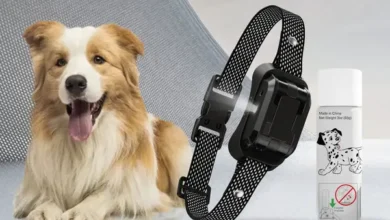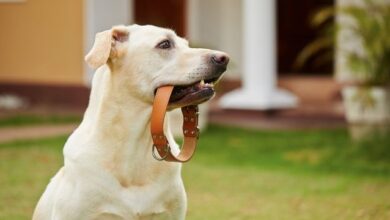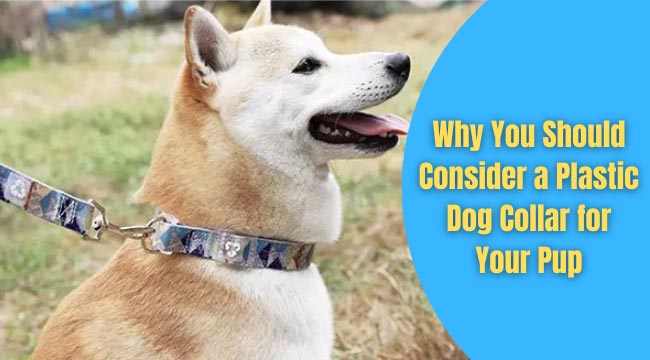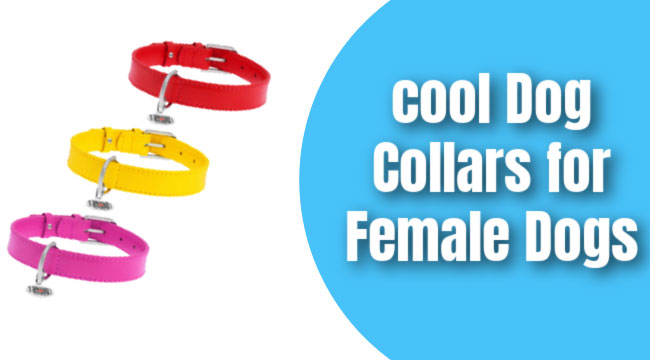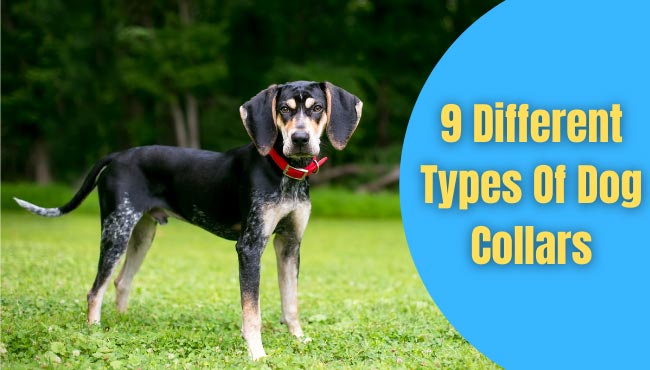
Dogs wear collars for various reasons, including training, walking, identification, and even fashion. Dog collars are more than just that; they serve various functions, starting with keeping your pet safe and close by.
In this article, we will cover nine different types of dog collars that you can buy for your dog.
Read More:
- How To Prevent Your Dog From Chewing Everything
- 5 Practical Tips To House Train Your New Puppy
- An Easy Guide To Creating A Customized Dog Tag
- The Different Types of Emotional Support Animals
- Reasons a Harness Will Stop your Dog from Pulling
1. Regular Collars
A range of dog collars for everyday use allows you to display your unique style. Metal buckle collars or quick-release clasp collars come in various materials, colors, and styles. Buckle collars are preferred by many pet owners for more muscular dogs, as quick-release clasps are less durable.
Leather collars with rolled edges are more resistant to hair loss and splitting. If your dog gets lost, make sure he wears a name tag on his collar with your current contact information.
2. Prong Collars
Some trainers once recommended these collars for big, rebellious dogs who dragged on the leash, but most animal experts no longer recommend them. They are also called pinch collars and are used for training punishment.
When the dog pulls against the collar, the metal prongs pinch the skin, causing skin injuries and damage to the operator if their fingers get trapped in the chain. Instead of employing positive reinforcement, these collars use pain and punishment to curb inappropriate actions.
In many situations, dogs learn to stop tugging while wearing the pinch collar, and the habit does not transfer to other collars or leashes; therefore, they are not considered training.
These collars should only be used with extreme caution and should never be put on your dog unattended. That is why you should know how to put a prong collar on your dog more accurately.
3. Hightech Smart Collars
Smart collars are far more technologically advanced than regular buckle collars. Among these, Anti Bark Collars help train your dog to reduce nuisance barking by using gentle corrections. Other smart collars come with various features, such as GPS tracking to monitor your dog’s whereabouts, tools to observe changes in their behavior, and additional training aids. Most of them work with smartphone apps, and some are even waterproof and feature WiFi connectivity.
4. Martingale Collars
Martingale collars, aka limited-slip or greyhound collars, are designed to prevent dogs from slipping out of collars while on a leash. With a tug of the leash, the collars tighten somewhat, but not to be uncomfortable, and there is a stop mechanism to prevent additional closure on the neck.
They are just snug enough to keep the dog from slipping out of the collar. It is beneficial for dogs with wide necks and narrow heads, such as greyhounds, who may slip out of a regular collar.
Martingale collars are commonly constructed of nylon or similar material and come in various colors and styles. These collars are designed for sighthounds, but you can use them on most dog breeds.
5. Halters or Harness for The Head or Head Collars
Headcollars or halters resemble muzzles, but they serve a completely different purpose. These halters function more like head harnesses and teach a dog to walk on a leash and heel.
The head halter gives the handler more control over the dog’s head, allowing him to redirect the dog to the desired behavior when unwanted behaviors arise. More animal experts recommend this training device since it provides a positive reinforcement approach to training.
When worn properly, headcollars can successfully eliminate tugging and support other training. Because some types of head collars can be backed out of, they must not leave on forsaken dogs or dogs on a very long lead. One of the various dog head collar brands available is the Gentle Leader.
6. Choke Chains or Chain Slip Collars
Choke Chains or Chain Slip Collars are not recommended by animal behaviorists or most veterinarians due to their risks. They were created to teach a dog to walk on a leash and heel.
A brief tug on the leash causes the collar to tighten around the dog’s neck, which is used to correct behavior. Choke chains have become less popular among dog trainers as they offer health dangers and rely on punishment rather than positive rewards.
These collars are not generally advised since they can harm your dog’s neck and even result in deadly strangulation injuries. It is especially harmful in small breed dogs that already have tracheal issues. Chain slip collars must not leave on an unsupervised dog since they can strangle them.
7. Harness
Harnesses are made to fit over a dog’s chest and tummy, crossing over the back. A leash can be fitted to the top of the harness. Some dog owners prefer harnesses to collars, particularly for pulling dogs. Neck strain is not caused by harnesses.
Harnesses are suitable for dogs with neck, back, or airway problems and should be used in dogs predisposed to these issues, such as small breed dogs. While a standard harness is not a training device, some harnesses, such as the walking harness, and those clips in the front of the chest to avoid pulling, are designed to do so.
8. Braided Material Slip Collars or Show Collars
Slip collars constructed of braided materials such as leather, nylon, or metal are shown collars. These collars are not mistaken for chain slip collars; they can tighten around a dog’s neck and should never be left alone.
9. Martingale Leads
Martingale Leads are collars and lead in one. They work in the same way as Martingale collars. The collar piece fits over the head and tightens when the lead is tugged, preventing the lead from slipping off. A plastic tube glides down the lead to hold the collar in place.
Final Thoughts: Different Types of Dog Collars
Walking into your local pet store can seem intimidating, and walking down the leash, collar, and harness aisle.
There are numerous straps.
Because two dogs are not alike, there are so many different widgets. They range from drill sergeant strict to “you’re not my actual dad!” rebellious.
You can tame even the most vigorous Terrier or contain even the craziest Collie with the correct equipment.
